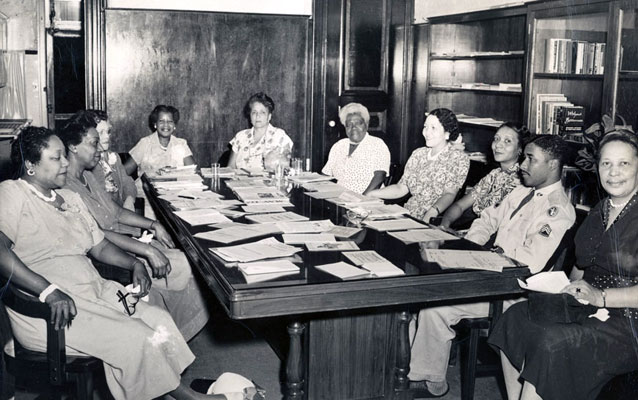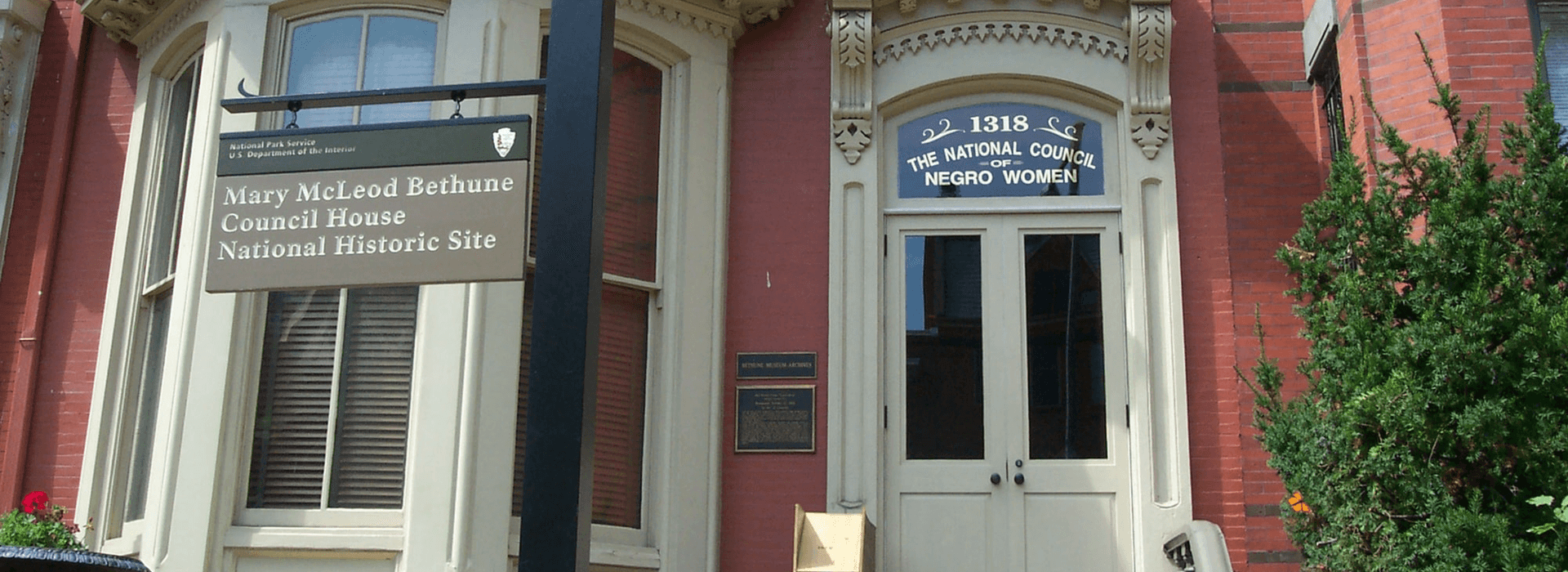Located at 1318 Vermont Avenue NW in the historic Logan Circle district of Washington, D.C., the Mary McLeod Bethune Council House National Historic Site served as the original headquarters for the National Council of Negro Women (NCNW). This was the final home of Mary McLeod Bethune, a prominent African-American educator, activist and civil rights leader. It was at this Second Empire Victorian townhome, according to this historic site’s content presented on the website of the National Park Service, that “Mary McLeod Bethune achieved her greatest recognition … Bethune and the NCNW spearheaded strategies and developed programs that advanced the interests of African American women.”
This home should not be confused with The Mary McLeod Bethune Home, an American Foursquare house that is located on the campus of Bethune-Cookman University in Daytona Beach, Florida. That structure, built circa 1904-1905, was bought by the Daytona Educational and Industrial Training School (presently known as Bethune-Cookman University) in 1913 to be the home of the school’s founder, Mary McLeod Bethune. This house would be her home from then until her passing in 1955. As with the Mary McLeod Bethune Council House, the Mary McLeod Bethune Home was designated a United States National Historic Landmark (1974) and is a historic museum. However, the Mary McLeod Bethune Home is managed by the Mary McLeod Bethune Foundation whereas the Mary McLeod Bethune Council House is maintained by the National Park Service.
From the house in Washington, D.C., Mary McLeod Bethune led the NCNW in their fight against racial, class and gender discrimination. Founded by Bethune on December 5, 1935, the NCNW was a collaboration of African-American women’s social organizations whose unification could implement positive and sustainable actions to greater ensure rights for African-Americans and women, regardless of class, socioeconomic status or education. The goal of Bethune attracted thousands of African-American women to join the NCNW and, according to the national park website, “Their global vision, ability to reach across the aisle, and Bethune’s long-term vision helped lay a solid foundation on which the NCNW still stands today.”

Sourced from website of the National Park Service (No copyright infringment intended).
The vision of Mary McLeod Bethune had become legendary by the time she founded the NCNW. Her actions, from starting one of the few institutions of higher learning available to African-Americans below the Mason-Dixon line with only $1.50 to organizing national conventions to address the needs and concerns of African-Americans, endeared her to many. That endearment and high regard for Bethune made possible the purchase of the Victorian home at 1318 Vermont. In 1943, the home was sold to her and the NCNW for $15, 500, of which $10,000 was donated by Marshall Field, department store founder, and contributions were made by executive members of the council. NCNW sections and affiliates supplied additional funding.
Mary McLeod Bethune and the NCNW were able to purchase the home from Alphonso and Anna Gravalles, who used the structure as a tailoring shop for women and as their personal home for thirty-one years. The area in which the house is located, Logan Circle, was named after John Alexander Logan, a general for the Union Army and an Illinois congressman of the Democratic Party. Before the Civil War, the land had been primarily used for farming. During the war, it had become a refuge for Blacks who escaped slavery as well as those who were legally free. After the ending of the Civil War, the area began to be settled by a racially-diverse group of middle-class businessmen and professionals.
The Mary McLeod Bethune Council House contains fifteen rooms, a kitchen and two bathrooms. It not only was the national headquarters for the National Council of Negro Women or the residence of Bethune, but it accommodated guests who visited on council business. Honored guests included Bethune’s good friends and allies, First Lady Eleanor Roosevelt and civil rights activist, Mary Church Terrell, the founder of the National Association of Colored Women. The rooms are named in honor of individuals and organizations who helped furnish the home.
From 1943 to 1966, history was made at this home, as the Conference Room was where the goals of the NCNW were implemented via specific courses of action. Actions in which the NCNW contributed include desegregation of public accommodations, such as restaurants and theatres in Washington, D.C. and integration of Blacks into the military and in public schools throughout the United States. Programs were created to address issues, from education and employment to health care and housing, that directly impacted Black women. In 1963, the home even served as a meeting point for those who attended the March on Washington for Jobs and Freedom.
In early 1966, a fire from the furnace destroyed much of the Council House; attempts to save the building resulted in extensive water and smoke damage. Because of the destruction, the NCNW had to relocate to 1346 Connecticut Avenue. In 1975, after nine years of inactivity, the NCNW raised the resources needed to repair, restore and renovate the Council House’s main structure and carriage houses and 1318 Vermont Avenue was admitted on the Washington D.C. Register of Historic Sites. Overseen by Dr. Bettye Collier-Thomas, an author and historian, the Bethune Historical Development Project began in the autumn of 1977 and in the winter of 1979, opened. The Mary McLeod Bethune Council House was the first museum in the United States to be, as per the Council House website, “dedicated solely for the purpose of the collection, preservation and interpretation of Black women’s history.” In 1982, the Council House was declared a National Historic Site by an Act of Congress and in 1994, it was acquired by the National Park Service for custodianship. The national headquarters of the National Council of Negro Women is located at 633 Pennsylvania Avenue, Northwest, Washington, D.C. in the Penn Quarter neighborhood. Formerly known as the Central Bank, the Late Victorian-style structure is presently named the “Dorothy I. Height Building” and is listed on the National Register of Historic Records in 1995. It is named after Dorothy I. Height, a mentee of Mary McLeod Bethune and the national president of the NCNW from 1957 to 1997.
The mission of the Mary McLeod Bethune Council House National Historic Site is “to identify, collect, develop, interpret, and preserve the legacy of Mary McLeod Bethune including her unique focus on the individual and collective history of African American women.” Its goals include increasing knowledge and comprehension of Mary McLeod Bethune, specifically, and African-American women, as a whole, and providing archival research material and resources on African-American women.
Because of its national register status, visitors to the Mary McLeod Bethune Council House National Historic Site have specific rules that must be followed, whether you are visiting, conducting research, or taking a tour. A tour starts on the hour and once it begins, visitors cannot join. It does allow for a maximum of twenty-five persons per tour. The home’s design does not allow for strollers and large bags and eating, drinking, chewing gum and smoking are not permitted on the premises. Also, it should be noted that this site is not accessible for those with ability issues, as the second and third floors are only available by access of stairs.
There is a bookstore, administered by Eastern National, that may be accessed onsite as well as online. Eastern National, as stated on the National Park Service website, “is a not- for-profit cooperating association that supports the National Park Service. Cooperating associations are recognized by Congress as a means to assist the educational and interpretive mission of the National Park Service.”
The Mary McLeod Bethune Council House National Historic Site creates various community outreach programs and participates in presentations, such as book talks, the most recent featuring the book Strategic Sisterhood, with author, Dr. Rebecca Tuuri. It was in celebration of the 144th birthday of Mary McLeod Bethune. Activities such as “Mrs. Bethune’s Washington Bus Tour” and the “Mary McLeod Bethune Trail”, that involves sites from South Carolina and New York City to Florida and Georgia, are essential in better understanding and appreciating the rich life and extensive legacy of Bethune. In these ways, the vast contributions that Mary McLeod Bethune and countless African-American women of the National Council of Negro Women made to society are honored.
